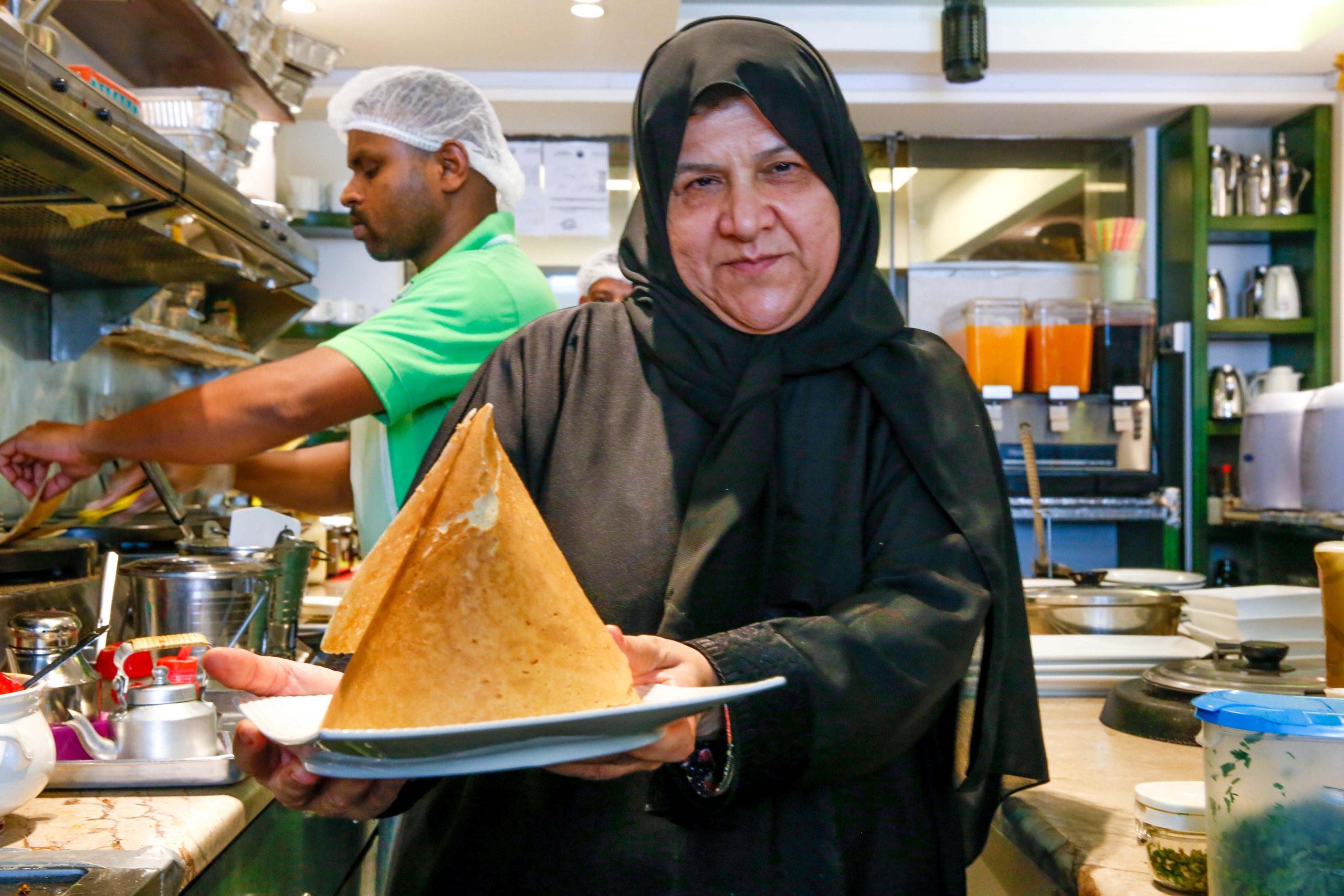
At the crack of dawn, Shams Al Qassabi is already in the kitchen.
The Qatari mother of five – and grandmother of 10 – spends her mornings preparing mixes and batters at home before she heads to Souq Waqif to open her restaurant.
Only a year old, Shay Al Shoumous specializes in Qatari breakfast foods, including piping hot plates of baid o tomate (eggs and tomato), baid shakshoka (scrambled eggs), khobiz regag (crepe-like bread), and balaleet (saffron-infused vermicelli).

With a smile on her face, the 52-year-old Al Qassabi opens the restaurant for business at 6:30am each day, alternating between welcoming her guests and cooking up plates of traditional fare.
“She’s always loved to serve,” Al Qassabi’s daughter Eman told Doha News. “That’s how we know her.”
“We’ve had maids all our life, but whenever we had guests over, it was our mother serving them,” Eman added.
Although women do lead some of Qatar’s top institutions, there aren’t many female-owned and managed businesses at the souq.
And at an age where many people might be looking forward to retirement, Al Qassabi shows no signs of slowing down.
“We’ve learnt humility and service from her, that there’s no shame in doing this…I’m proud to call her my mother,” Eman said.
No easy journey
Over the years, Al Qassabi has seen many successes, in no small part due to her work ethic and love of food, which she credits to her family.
A visit to her restaurant by former first lady Sheikha Moza last year, she added, was the ultimate “stamp of approval.”

But when she was getting started, she faced no shortage of criticism and scorn. Speaking to Doha News, Al Qassabi said:
“We come from a really conservative family, and at that time, a woman doing something like this was rare. I didn’t tell anyone in the family because I didn’t want to disappoint anyone.”
Her background in food began early on. At age three, she would watch her grandmother cook and make food from scratch.
“In the old days, ladies weren’t really allowed to go out, because of the tradition, but they used to gather at home. We used to cook at home, buy fabrics and sew, and do (artisanal) things like that,” she said in Arabic, as her daughter Eman translated.

“My grandmother used to do all of this. Whenever I would see her cook, I used to help. I liked putting the Omani lemon in the saloona. I liked to be part of that process.”
As she grew up, married and had her own kids, she took part in those traditional activities. But as her own children grew older, she started looking for something more.
In 2001, when the Social Development Center held one of its first exhibitions dedicated to showcasing local talent and home business, she jumped at the opportunity.
“My father was a trader in the old Souq Waqif, and he would always say that you have to be self-made, that a businessman has to start from zero,” Al Qassabi said.
With three lemon trees at home, and QR500 from the bank, she took up the crafts she’d learned from her grandmother of pickling and spices.
Her daughter Eman recalled:
“We were very young when it all happened. My mom made bottles of lemon pickle and a few other items and bottled them in glass cream cheese jars. She didn’t really know how to take off the brand label, so she created a design out of dried spices and fruits and stuck them onto the label with fabric.
Everything she did and she made, and she still does that to date. She does everything herself.”
When the exhibition ended a few days later, Al Qassabi came out with QR32,000 in sales and a newly formed business idea.
She began selling her products out of a small room in the family’s home and at different exhibitions around Qatar. And in 2004, when the newly-renovated Souq Waqif reopened, Al Qassabi decided to rent a shop there.
“(Apparently) they had heard of me, and when I called to ask if I could rent a store, they said ‘yes, welcome, we were looking for you!’” she said.
At the time, she was the only Qatari woman to have opened a business in the main souq, and to date is one of the few who shows up to work daily.
Backlash
When her spice and pickle store first opened at the souq, Al Qassabi faced heavy criticism from friends of her father’s, who had known him as a well-established and successful trader.

Her daughter Eman explained:
“My grandfather had friends here, and his friends were very upset to see the daughter of one of their friends here. They would say that this isn’t a place for her… ‘it’s a place for men, she’s a lady, she had to stay at home.’ I still remember all of this.”
Despite the negative social pressures, Al Qassabi felt she had to continue with her passion, motivated in large part by the work of Sheikha Moza, whom she says has become a role model for her and for hundreds of Qatari women.
A new opportunity
In September 2013, the souq’s management decided to move Al Qassabi’s store from its location behind Beirut Restaurant to a more prominent area next to the Al Bidda hotel.
She had planned to just move and reopen her shop, when she got a surprise phone call:
“Six months later, when we were about to open this new place, they called me and said ‘we need a coffee shop open…in 20 days’. I said ‘What? Ok!’
In the car, I started contacting vendors and printing companies to do the menu. I put down everything that I could think of. There was no guidelines as to what kind of a coffee shop it had to be, but it had to be open in 20 days.”
The restaurant opened at the beginning of Ramadan in 2014 with six tables, 12 chairs, no staff and Al Qassabi as the only cook. Unsure of her menu, she decided to give food out for free.

“People were very happy. Who doesn’t want free food? There were a lot of visitors from other GCC countries and when they came here, she was like ‘here, everything is for free!’” Eman said.
She added, “This isn’t a five star place. it’s not fancy at all. It’s homely and its authentic food, and we were worried that people wouldn’t understand the concept. But alhamdulillah they really liked the food, and the opening went well.
Then Sheikha Moza and Sheikh Hamad came to the restaurant after Ramadan and for my mom, that was it. She had reached her goal.”
The restaurant has since been visited by numerous regional celebrities, including Kuwaiti footballers, ministers and social media mavens, pictures of whom line the restaurant’s walls.

Al Qassabi, whose choice of profession has now been accepted by family and friends alike, encourages all women to follow their dreams and create “original” work.
She feels society is becoming much more receiving of women who choose unorthodox livelihoods, and is slowly opening up to the idea of women in the workforce.
“Back then, when women wanted to do something, the door was always closed on their face. There was always a red line. So we stopped thinking that we could do things. But since Sheikha Moza has come, she has become a role model,” Al Qassabi says.
Having achieved what she initially set out to do, Al Qassabi is content, for now.
But in the future, she dreams of opening a factory, to take her pickles and spice mixes to the masses.
Thoughts?







